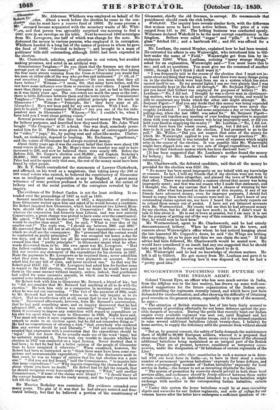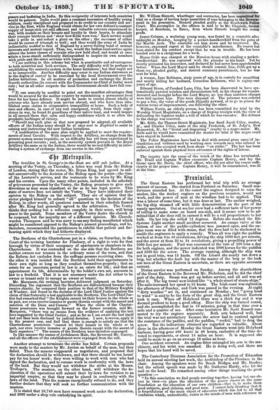SUGGESTIONS TOUCHING THE FUTURE OF THE INDIAN ARMY.
Colonel Vincent Eyre, an officer who has seen much service in India, from the Affghan war to the late mutiny, has drawn up some well-con- sidered suggestions for . the future organization of the Indian army. After describing the regiments recently raised, and which have just been disbanded for insubordination, and after showing the difficulty of obtaining good recruits on the present system, especially on the spur of the moment, he says-
" The attention of British statesmen has of late been fairly aroused to the necessity of providing effectually for our home defences against the pos- sible dangers of invasion. During the perils that recently beset our Indian empire every available regiment was sent out, until England and her colonies were almost denuded of regular troops, and it was deemed expedient to raise several additional battalions (about twenty-four, I believe) for home service, to supply the deficiency until the pressure from without should cease.
"But as, by general consent, the safety of India demands the maintenance there of 60,000 to 80,000 European soldiers, whereof it is proposed that about one-third should be locals, there seems every chance of the aforesaid additional battalions being maintained as an integral part of the British army: They are at present, however, considered as temporary excre- scencies, under the designation of 2d battalions of certain regiments of the Line.'
"My proposal is to alter their constitution in such a manner as to dove- tail with our local force in India—or, to have in their . stead a certain number of permanent garrison battalions' expressly for home defence, and to raise a corresponding number of Indian battalions' expressly for local service in India,—the former to jet as recruiting depots for the latter. "The system of promotion by seniority should prevail in both these local services alike, and exchanges should be freely allowed between them under certain conditions—i.e., an individual attached to a home battalion might exchange with another in the corresponding Indian battalion, admits paribus. "Under this system the home battalions would be at once recruiting depbts and nurseries for our Indian regiments, and arks of refuge for our veteran heroes after the latter have undergone a sufficient quantum of ex-
posure and buffeting in India. By this reciprocity of interests both countries would be gainers. India would gain a constant succession of healthy young soldiers, ready disciplined and prepared to do credit to our country and ser- Nice in the East, while England would obtain for her own defence a constant supply of home-sick yet still efficient and valuable veterans experienced in war, with medals on their breasts and loyalty in their hearts, to stimulate their younger brethren and show how fields were won.' Each service would take a pride in and reflect a glory on the other ; the successes of either would be causes of triumph to both ; and thus would the army of India be indissolubly wedded to that of England by a never-failing bond of mutual interests and mutual regard. Thus, too, would the Indian local service again attract the better classes of recruits who now hold aloof, and would at once attain a locus standi sufficiently distinguished to inspire its own members with pride and the sister services with respect. "I see nothing in this scheme but what is practicable and advantageous to both countries and both services. The only difficulty will be perhaps in establishing the seniority system in the home battalionsL• but that ought not to be insuperable. Another difficulty may occur to our Indian statesmen as to the degree of control to be exercised by the local Government over the Indian battalions. In all matters of promotion and exchange the Horse Guards authorities (in concert with the Commander-in-Chief of India) must rule ; but in all other rerpects the local Government should have full con- trol.
"It can scarcely be needful to point out the manifest advantages that would be secured for the mother country by maintaining a permanent local force for her home defence. It might be made to consist almost wholly of veterans who have already seen service abroad, and who have thus esta- blished some claims to comparative tranquillity at home. Such a body of men and officers, in case of any real emergency, would, from their expe- rience in war, be found fit guardians of their native land, and would inspire in all around that calm and happy confidence which is so often the prophetic harbinger of victory. " Should any such plan as that now proposed be adopted, all available officers of the Indian army should be at once sent to England to assist in raising and instructing the new Indian battalions. "A modification of the same plan might be applied to meet the require- ments of local Cavalry. With respect to the Artillery, no change from the present system seems requisite, as no difficulty has yet been esperienoed in procuring good recruits ; and, as the seniority system prevails in the Royal Artillery the same as in the Indian, there would be no real difficulty in intro- ducing a system of exchange from one service to the other."



























 Previous page
Previous page